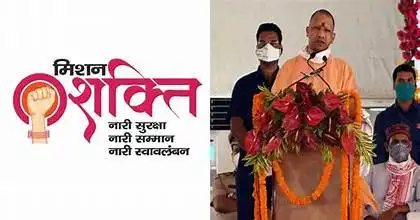In the spirit of fostering women’s economic empowerment, the Yogi government has launched the fourth phase of Mission Shakti, coinciding with the auspicious Navratri. This initiative focuses on connecting rural and urban women with various schemes to engage in lifelong livelihood activities. For rural women and their families, the emphasis is on ensuring economic self-reliance by integrating them into self-help groups, while urban women are geared towards skill enhancement and job opportunities. Chief Minister Yogi initiated the fourth phase of Mission Shakti with great enthusiasm from his official residence on Saturday.
Empowering Rural Women through Self-Help Groups
Under the Mission Shakti campaign, the Rural Development Department aims to connect over 8,97,380 families to self-help groups, ensuring their social and economic self-reliance. According to the approved annual work plan for the financial year 2023-24, a total of 2,20,000 self-help groups will receive revolving funds to encourage financial inclusion and lifelong livelihood activities for female members. An additional 1,05,000 self-help groups will benefit from community investments to support financial inclusion and livelihood activities.
Enhancing Women’s Skills for Empowerment
Under the Urban Development Department, the focus lies on enhancing the skills of women and fostering self-reliance. Training will be provided on various activities, such as sewing, handicrafts, animal husbandry, beekeeping, poultry, fish farming, and culinary skills. Efforts will also be made to identify widows, vulnerable women, and destitute women and assist them in finding employment through social workers. The campaign will also include organizing women’s health camps and providing information about the Ayushman Bharat Yojana. To honor the contributions of working women, nine working women from different categories within the municipal offices will be honored with the “Nav Shakti Samman.”
Focusing on Other Important Aspects
The Panchayati Raj Department is planning meetings in 58,189 gram panchayats, 826 block panchayats, and 75 district panchayats to centralize discussions on women’s issues and safety. The campaign will ensure the registration of 100% of female births on the CRS portal through monitoring committees for checking female child births. Additionally, the Urban Development Department will promote hygiene, handwashing, toilet cleanliness, and the importance of clean drinking water to prevent communicable diseases and fever. Exceptional efforts will be made to encourage and reward girls, adolescents, and women excelling in the field of cleanliness under the “Swachhata Abhiyan.”
Promoting Key Government Initiatives
As part of this initiative, key government schemes like “Beti Bachao Beti Padhao,” “Kanya Sumangala Yojana,” “Annapurna Yojana,” “Janani Suraksha Yojana,” and emergency helpline numbers such as 1098, 1090, and 112 will be extensively promoted. In municipal offices, selfie points will be set up to exhibit the achievements of Mission Shakti, showcasing a pink brochure containing experiences, suggestions, and addresses related to women’s empowerment. To boost women’s creative activities, competitions and workshops in painting, rangoli, henna design, and cultural events such as drama and street plays will be organized.
FAQs About Mission Shakti
Q1: What is the main objective of Mission Shakti’s fourth phase?
A1: The fourth phase of Mission Shakti aims to empower women in rural and urban areas through self-help groups, skill development, and economic independence.
Q2: How many families are targeted for inclusion in self-help groups under this initiative?
A2: The initiative plans to connect over 8,97,380 families to self-help groups for ensuring social and economic self-reliance.
Q3: What financial support is provided to self-help groups to encourage lifelong livelihood activities?
A3: Self-help groups will receive revolving funds, totaling 2,20,000, to promote financial inclusion and support lifelong livelihood activities for their female members.
Q4: What measures are taken to enhance the skills of urban women?
A4: Urban women will receive training in various fields, including sewing, handicrafts, animal husbandry, beekeeping, poultry, fish farming, and culinary skills to improve their employability.
Q5: How is the government promoting cleanliness and hygiene?
A5: The government is promoting cleanliness by organizing events and rewarding girls, adolescents, and women excelling in cleanliness under the “Swachhata Abhiyan.”
Q6: What key government schemes are being promoted as part of this initiative?
A6: The campaign is promoting government initiatives such as “Beti Bachao Beti Padhao,” “Kanya Sumangala Yojana,” “Annapurna Yojana,” “Janani Suraksha Yojana,” and emergency helpline numbers like 1098, 1090, and 112.
Conclusion
Mission Shakti’s fourth phase represents a significant step towards women’s empowerment in both rural and urban settings. By integrating them into self-help groups and providing essential training, the government is striving to ensure economic self-reliance and skill enhancement for women. This holistic approach to women’s empowerment covers a wide range of areas, from hygiene to cultural events, ultimately aiming to uplift and strengthen the position of women in society.









